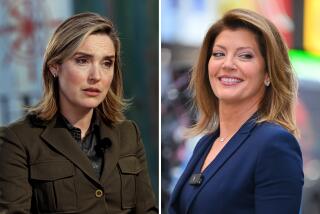A Call They Dreaded for 30 Years : Quiz shows: Only some ‘50s participants are talking--and Charles Van Doren isn’t one of them.
- Share via
In his final appearance on “Twenty-One,” contestant Herbert Stempel was given a question he could answer, about the Oscar-winning movie “Marty” (ironically, Stempel had identified personally with the title character), and was told to miss it.
Afterward, Stempel tried to expose the corruption but had no corroborating witnesses, and the deceit didn’t begin to unravel until an unemployed actor who was a contestant on “Dotto” noticed that the woman who preceded him on the show was studying a notebook of questions and answers backstage. He contacted a lawyer.
The networks claimed that they knew nothing of the deception, blaming the fraud entirely on the producers, but the public was outraged and Congress decided to look into the matter.
Now, in “The Quiz Show Scandal,” some but not all of the players who were involved have told what really happened.
“Here I was contacting people who had been hiding for 30 years,” said documentary producer Julian Krainin. “They got the phone call they had been dreading all their lives.”
But Charles Van Doren did not want to discuss it. For more than three decades, Krainin said, “Van Doren has pretty much been keeping to himself. Until recently, he still lived in the house in Connecticut where he lived next to his parents. He just got a house within the last two years in Florida.”
Krainin said that Van Doren, who had been on the faculty at Columbia University, married the woman he hired to answer his fan mail, and, after the scandal broke, worked for a time for Encyclopaedia Britannica in Chicago.
He has written half a dozen books in various areas, Krainin said, and just completed another. “But he can’t go on the circuit to promote the books because of what happened to him. He found it a very tearing experience.”
Stempel also had hoped to teach at the college level, Krainin said. Instead, Stempel spent a career working for the New York City Department of Transportation as an expert witness in lawsuits against the city.
Another contestant was Joyce Brothers, a psychologist, who was “in fact very bright and had a great memory,” Krainin said, “but they did try to get rid of her.”
The problem was that Brothers did not wear makeup, a fact that annoyed the show’s sponsor, Revlon.
“When Charlie Revson saw her on the air, he said to get rid of her,” said Krainin. “Her category was boxing, so they threw her a curve, started asking questions about referees. But she knew them. For weeks she had studied the whole subject of boxing and had virtually memorized three books about it.”
There is no indication, he said, that Brothers, now a widely syndicated columnist in The Times and other papers and a frequent TV talk show guest, was given answers or easy questions.
More to Read
The complete guide to home viewing
Get Screen Gab for everything about the TV shows and streaming movies everyone’s talking about.
You may occasionally receive promotional content from the Los Angeles Times.






